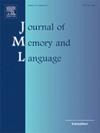嵌入式记忆计算框架:解释语义信息对言语短时记忆的影响
IF 3
1区 心理学
Q1 LINGUISTICS
引用次数: 0
摘要
我们介绍了嵌入式记忆计算框架(eCFM),这是一种将结构化语义词表征与基于实例的记忆模型相结合的模型,用于解释语义信息在言语短时记忆中的影响。eCFM 结合了外显 MINERVA 2 模型和语义潜语义分析模型的原理。在回顾语义信息如何影响言语短时记忆表现之后,我们展示了 eCFM 在一个共同的计算框架内调和各种现象的能力。我们的模型捕捉到了一些重要发现,如语义信息在序列回忆中的影响、语义信息在序列重构中的减弱以及任务难度对语义信息的影响。在五个实验中,我们检验了 eCFM 得出的预测结果。实验一和实验二操纵了列表组织,实验一使用相关或不相关词语交替列表,实验二使用阻塞列表。实验 3 改变了呈现率,实验 4 重新审视了语义信息对顺序信息的不利影响,而实验 5 则探讨了错误回忆。我们发现,语义信息与列表构成相互作用,呈现率影响其影响程度,而语义信息对顺序信息的影响与主流观点相反。此外,增加与非研究语义引诱相关的研究词的数量会提高错误回忆率。eCFM捕捉到了这些发现以及项目层面的记忆。我们的演示深入揭示了言语短时记忆的认知机制,以及回忆中语义记忆和外显记忆过程的相互作用。本文章由计算机程序翻译,如有差异,请以英文原文为准。
An embedded computational framework of memory: Accounting for the influence of semantic information in verbal short-term memory
We introduce the Embedded Computational Framework of Memory (eCFM), a model that integrates structured semantic word representations with an instance-based memory model to account for the influence of semantic information in verbal short-term memory. The eCFM combines principles from the episodic MINERVA 2 model and the semantic Latent Semantic Analysis model. After reviewing how semantic information impacts verbal short-term memory performance, we demonstrate eCFM’s ability to reconcile various phenomena within a common computational framework. Our model captures key findings, such as the influence of semantic information in serial recall, its reduction in serial reconstruction, and the impact of task difficulty on semantic information. In five experiments, we tested predictions derived from the eCFM. Experiments 1 and 2 manipulated list organization, with Experiment 1 using alternating lists of related or unrelated words and Experiment 2 using blocked lists. Experiment 3 varied presentation rates, Experiment 4 revisited the detrimental effect of semantic information on order information, and Experiment 5 explored false recall. We found that semantic information interacts with list composition, presentation rate affects the magnitude of its influence, and semantic information impacts order information contrary to the dominant view. Additionally, increasing the number of related study words to a non-studied semantic lure boosts false recall. The eCFM captured these findings as well as memory at the item level. Our demonstration provides insight into the cognitive mechanisms underlying verbal short-term memory and the interplay of semantic and episodic memory processes in recall.
求助全文
通过发布文献求助,成功后即可免费获取论文全文。
去求助
来源期刊
CiteScore
8.70
自引率
14.00%
发文量
49
审稿时长
12.7 weeks
期刊介绍:
Articles in the Journal of Memory and Language contribute to the formulation of scientific issues and theories in the areas of memory, language comprehension and production, and cognitive processes. Special emphasis is given to research articles that provide new theoretical insights based on a carefully laid empirical foundation. The journal generally favors articles that provide multiple experiments. In addition, significant theoretical papers without new experimental findings may be published.
The Journal of Memory and Language is a valuable tool for cognitive scientists, including psychologists, linguists, and others interested in memory and learning, language, reading, and speech.
Research Areas include:
• Topics that illuminate aspects of memory or language processing
• Linguistics
• Neuropsychology.

 求助内容:
求助内容: 应助结果提醒方式:
应助结果提醒方式:


